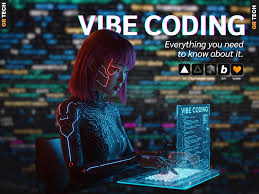The advent of 'vibe coding'—an artificial intelligence (AI)-assisted, improvisational approach to software development—marks a significant transformation in the role, skillset, and societal impact of software engineers. As generative AI models automate large portions of code production, the responsibilities and required competencies of human engineers are rapidly evolving. This paper examines the essence of vibe coding, the redefined role of software engineers, and the implications for the future of software development.
Title: The Role of Software Engineers in the Era of Vibe Coding
Abstract
The advent of 'vibe coding'—an artificial intelligence (AI)-assisted, improvisational approach to software development—marks a significant transformation in the role, skillset, and societal impact of software engineers. As generative AI models automate large portions of code production, the responsibilities and required competencies of human engineers are rapidly evolving. This paper examines the essence of vibe coding, the redefined role of software engineers, and the implications for the future of software development.
1. Introduction
The rise of vibe coding, popularized by AI researcher Andrej Karpathy in early 2025, shifts software engineering from manual, line-by-line programming to a model where developers co-create with AI assistants using natural language prompts513. Vibe coding allows even non-experts to participate in software creation, accelerating prototyping and altering the required expertise for building digital products534.
2. Defining Vibe Coding
Vibe coding is characterized by:
- Conversational collaboration with AI, where developers describe goals, requirements, or examples in natural language and receive generated code from the AI53.
- Focus on creative flow, iterative experimentation, and rapid prototyping, rather than strict code correctness or adherence to syntax5.
- Lower barriers to entry for non-programmers, democratizing software creation but raising new questions about code quality and accountability345.
3. Shifting Roles for Software Engineers
Vibe coding profoundly changes the traditional expectations of a software engineer. Key aspects include:
From Author to Architect
- Engineers now guide, review, and iterate on AI-generated code rather than authoring every line themselves356.
- They become system designers and product architects: specifying high-level intent, abstracting problems, and ensuring the overall system's quality and maintainability326.
Emphasis on Judgment and Oversight
- The ability to evaluate AI-generated outputs for correctness, performance, and security becomes paramount26.
- Debugging focuses on refining prompts and natural language input, instead of traditional stack trace analysis3.
Human Taste and Critical Thinking
- As AI automates technical tasks, human judgment, taste, and domain expertise are more valuable than ever2.
- The engineer’s role resembles that of a "product engineer," elevating user experience, business alignment, and ethical considerations23.
4. Essential Skills in the Vibe Coding Era
The most important skills for software engineers now include:
- Prompt engineering: Crafting precise, effective instructions for AI systems13.
- Communication and abstraction: Expressing complex requirements in clear, natural language32.
- System-level thinking: Seeing the big picture; understanding how components fit and interact3.
- Critical evaluation: Quickly assessing the quality, security, and maintainability of AI-generated code26.
- Continuous learning and adaptability: Keeping pace with rapidly evolving AI tools and paradigms16.
5. Implications for Hiring and Education
- Assessments and interviews may shift away from rote coding tests toward evaluations of system design, problem decomposition, and code review skills2.
- Traditional computer science education, once centered on syntax and language rules, will need a new emphasis on problem-solving, ethics, and AI literacy3.
- Teams may diversify, including non-engineers (e.g., designers, business analysts) who can now contribute directly to software creation with AI assistance34.
6. Opportunities and Risks
Opportunities:
- Accelerated development cycles and increased innovation due to faster prototyping and reduced technical barriers45.
- Greater inclusivity, as cross-functional teams can contribute to software production34.
Risks:
- Quality and security concerns, as less-experienced users may introduce vulnerabilities through unchecked AI-generated code53.
- Job market disruption, with a decline in demand for traditional coding roles, but potential for new roles centered on AI supervision, integration, and strategy12.
7. Conclusion
Vibe coding represents an inflection point in the evolution of software engineering. Software engineers will thrive not by resisting AI automation, but by embracing new roles as communicators, strategists, critical evaluators, and architects of software systems. The profession’s future lies in human–AI collaboration, where creativity, ethical judgment, and deep system understanding rise in prominence as routine coding recedes to the domain of machines312.
Keywords: vibe coding, software engineering, AI automation, prompt engineering, system architecture, human-in-the-loop, democratization of software development
- https://www.businessinsider.com/vibe-coding-software-engineer-skills-jobs-ai-cursor-chatgpt-2025-3
- https://www.linkedin.com/pulse/rise-vibe-coding-transforming-software-development-ai-moretti-lp3ff
- https://www.wwt.com/blog/vibe-coding-ai-assistants-and-the-evolution-of-software-engineering
- https://bakingai.com/blog/vibe-coding-developers-future/
- https://en.wikipedia.org/wiki/Vibe_coding
- https://www.dhiwise.com/post/vibe-coding-impact-software-developer-role
- https://www.reddit.com/r/ChatGPTCoding/comments/1jw44ya/is_
- vibe_coding_a_threat_to_software_engineers_in/
- https://www.wired.com/story/vibe-coding-engineering-apocalypse/
- https://shiftmag.dev/the-illusion-of-vibe-coding-5297/
